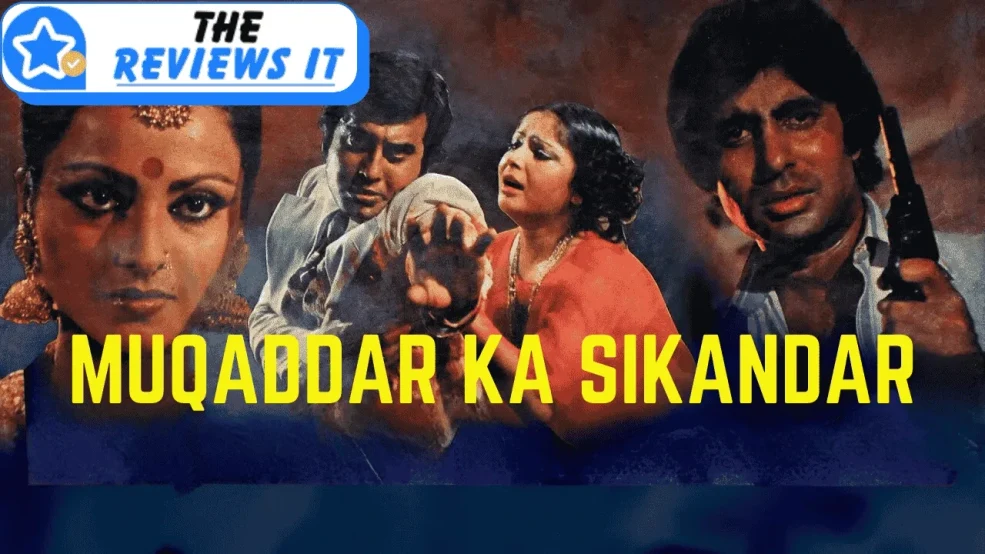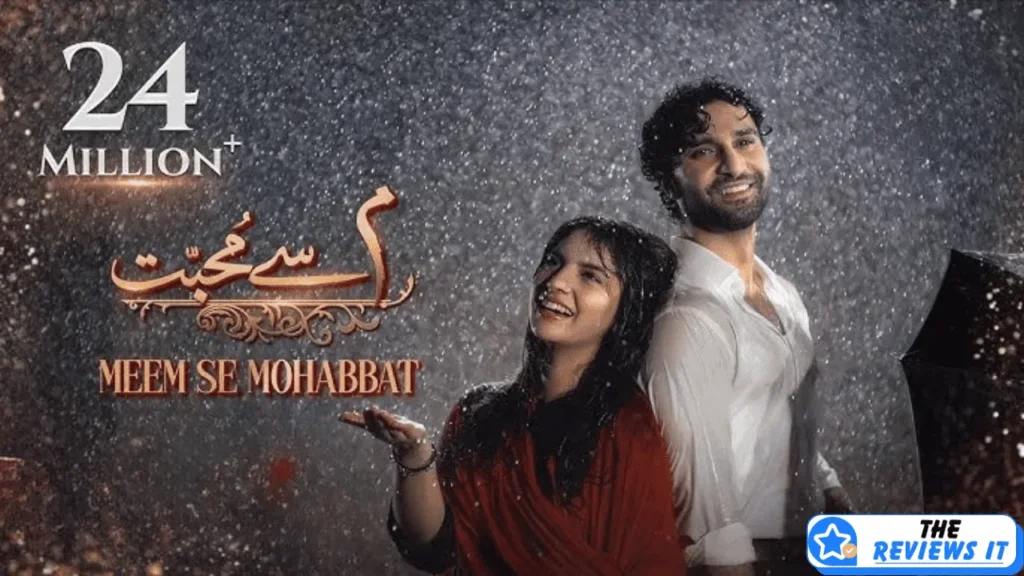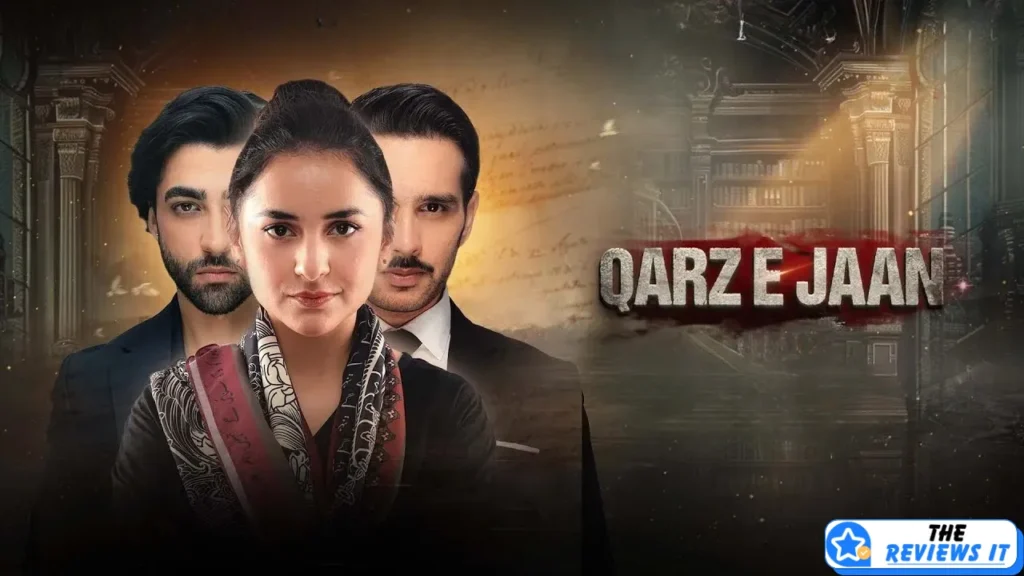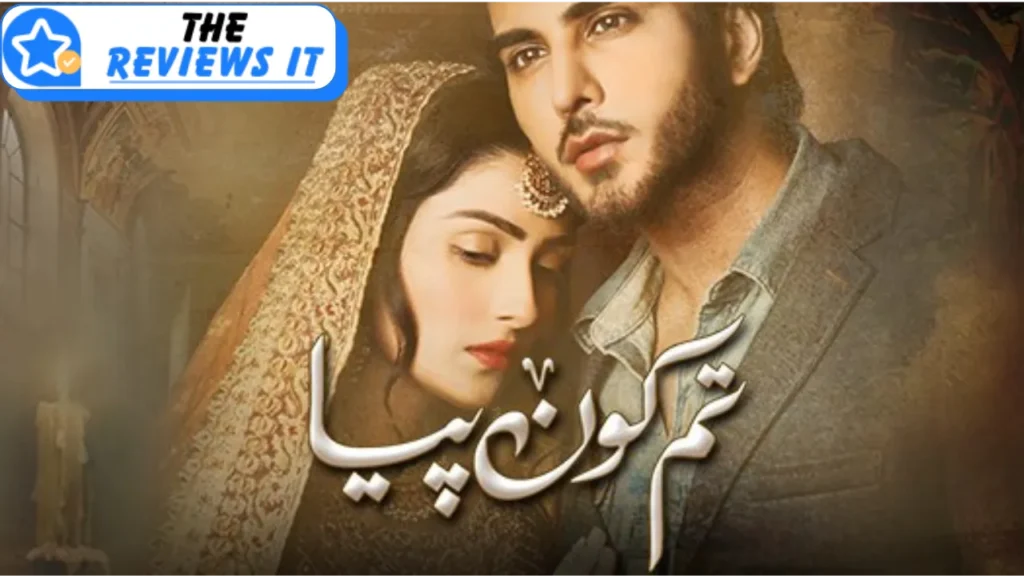Released in 1978, Muqaddar Ka Sikandar is a cinematic gem that still holds a special place in Bollywood’s history. Directed by Prakash Mehra and starring Amitabh Bachchan in one of his iconic roles, this film blends drama, action, and romance with unforgettable performances. Known for its powerful storytelling, the film introduces audiences to Sikandar, an orphan navigating the ups and downs of life in the bustling slums of Bombay. This Muqaddar Ka Sikandar Movie Review delves into why the film remains so impactful, analyzing its blend of tragedy and triumph that resonates deeply with viewers even decades after its release.
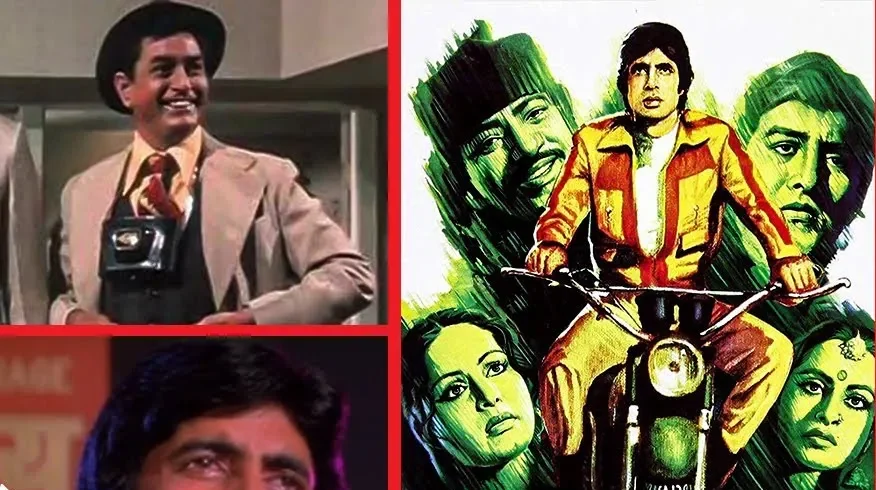
Plot Overview: A Tale of Love, Destiny, and Tragedy
In Muqaddar Ka Sikandar, the story of Sikandar, a young orphan, unfolds as he journeys through a life marked by love, fate, and tragedy. Abandoned early on, Sikandar faces the hardships of survival in Bombay’s slums. A wealthy man, Ramnath, takes him in as a servant, though due to a painful misunderstanding, Ramnath holds a deep resentment toward Sikandar. His daughter, Kaamna, however, sees Sikandar differently and forms a gentle bond with him, sparking his enduring love for her and introducing him to kindness for the first time.
When Fatima, a compassionate woman, adopts Sikandar, she renames him with a purpose, giving him the title “Sikandar,” meaning “conqueror.” She raises him as her own, instilling resilience and hope in him. However, tragedy strikes when Ramnath wrongly accuses Sikandar of theft, casting him out of the house. Fatima soon passes away, leaving Sikandar heartbroken but responsible for Mehroo, Fatima‘s daughter.
Growing up, Sikandar (now portrayed by Amitabh Bachchan) becomes wealthy by turning criminals in to the authorities, creating a comfortable life for himself and Mehroo. Yet, his heart remains captive to Kaamna (played by Raakhee), who now rejects his efforts to reconnect. To numb his sorrow, Sikandar finds refuge in alcohol and visits the brothel of Zohra Begum (Rekha), a courtesan who secretly loves him.
A significant twist arrives when Sikandar befriends Vishal (Vinod Khanna), a lawyer who saves his life, leading to a strong bond between them. Vishal and his mother move into Sikandar‘s home, unaware of Sikandar‘s affection for Kaamna. In a tragic misunderstanding, Vishal and Kaamna begin a relationship, as Sikandar asks Vishal to write a love letter for him due to his illiteracy. As Kaamna and Vishal plan their marriage, Sikandar hides his heartbreak, sacrificing his feelings for the friendship he holds dear.
The story’s tragedy deepens as Zohra poisons herself in a final act of love, after Vishal urges her to stay away. Meanwhile, Sikandar‘s enemies, Dilawar (Amjad Khan), who is infatuated with Zohra, and J.D. (Ranjeet), conspire against him. In a climactic showdown, Sikandar confronts Dilawar in a fierce battle, ultimately succumbing to his injuries. He stumbles into Kaamna and Vishal‘s wedding, expressing his love for Kaamna in his dying moments. The film ends with Sikandar’s tragic death in Vishal’s arms, his life flashing by in a heart-wrenching montage that epitomizes love, fate, and the inescapable hand of destiny.
Muqaddar Ka Sikandar presents a poignant blend of destiny, unrequited love, and the powerful hand of fate, showing how Sikandar overcomes material poverty only to remain shackled by emotional suffering. His journey highlights the unpredictable twists of life and the sorrow of unfulfilled love that ultimately defines his tragic end.
Characters and Performances: Who Shined in Muqaddar Ka Sikandar?
In Muqaddar Ka Sikandar, the characters breathe life into the themes of love, fate, and sacrifice, with each performance delivering a unique emotional depth that makes the movie unforgettable.
Sikandar (Amitabh Bachchan) – At the heart of the story is Sikandar, played by Amitabh Bachchan in one of his most iconic roles. He portrays Sikandar with a remarkable intensity, capturing both the vulnerability and resilience of a man who has endured deep emotional wounds. Bachchan’s portrayal of Sikandar’s unrequited love for Kaamna and his sense of duty toward his adopted family brings out layers of loneliness, strength, and sacrifice. His raw expressions in emotionally charged scenes and his physical transformation over time make Sikandar not only a tragic hero but also a compelling symbol of a man shaped by hardship and sorrow. This performance cemented Bachchan‘s reputation as a powerful actor, capable of portraying complex characters with emotional depth.
Kaamna (Rakhee) – Rakhee plays Kaamna, the woman at the center of Sikandar’s unrequited love. Kaamna’s character represents purity, compassion, and an innocence that contrasts sharply with Sikandar’s tragic life. Rakhee‘s performance brings out Kaamna’s gentle heart and quiet strength, even as she unknowingly becomes a source of pain for Sikandar. Her role is marked by restraint and subtlety, showing Kaamna’s internal conflict as she realizes the depth of Sikandar’s love for her. Rakhee’s portrayal captures Kaamna’s emotional arc, from her initial friendship with Sikandar to the moment she realizes his sacrifice.
Zohrabai (Rekha) – Rekha shines in the role of Zohrabai, the courtesan who falls deeply in love with Sikandar despite knowing she can never truly have his heart. Zohrabai is complex, both hardened by her surroundings and softened by her love for Sikandar. Rekha brings a powerful intensity to the role, portraying Zohrabai’s unselfish love and her own tragic arc with grace and poise. She combines vulnerability with a fierce sense of loyalty, creating a character who is simultaneously strong, tender, and tragic. Her expressive eyes and graceful dance sequences leave a lasting impression, and her scenes with Amitabh Bachchan have an undeniable chemistry, adding to the emotional depth of the film.
Vishal (Vinod Khanna) – Vinod Khanna portrays Vishal, Sikandar’s friend who is unaware of Sikandar’s love for Kaamna. Khanna’s role is one of loyalty and kindness, yet he is also unwittingly a cause of Sikandar’s pain. His strong, understated performance captures Vishal’s integrity and compassion, highlighting his bond with Sikandar and his naivety in not recognizing his friend’s sacrifice. Khanna brings an effortless charm to Vishal, making him a likable, relatable figure in the story, and his portrayal balances Sikandar’s turbulent world with a touch of warmth and friendship.
Dilawar (Amjad Khan) – As Dilawar, Amjad Khan delivers a memorable performance as the antagonist who holds his own grudges against Sikandar. Khan’s portrayal is marked by intensity and a certain ruthlessness, contrasting Sikandar’s silent suffering with his own raw ambition. His confrontation with Sikandar adds tension to the film and brings a darker edge to the story, highlighting the obstacles Sikandar faces in his final moments.
The cast of Muqaddar Ka Sikandar elevates the film’s themes, with each actor bringing depth and nuance to their roles. Amitabh Bachchan, Rakhee, and Rekha stand out as a trio whose intertwined fates and relationships drive the emotional core of the story. Their performances, along with Vinod Khanna’s warmth and Amjad Khan’s intensity, create a world filled with both beauty and tragedy, making Muqaddar Ka Sikandar a timeless tale of love and destiny.
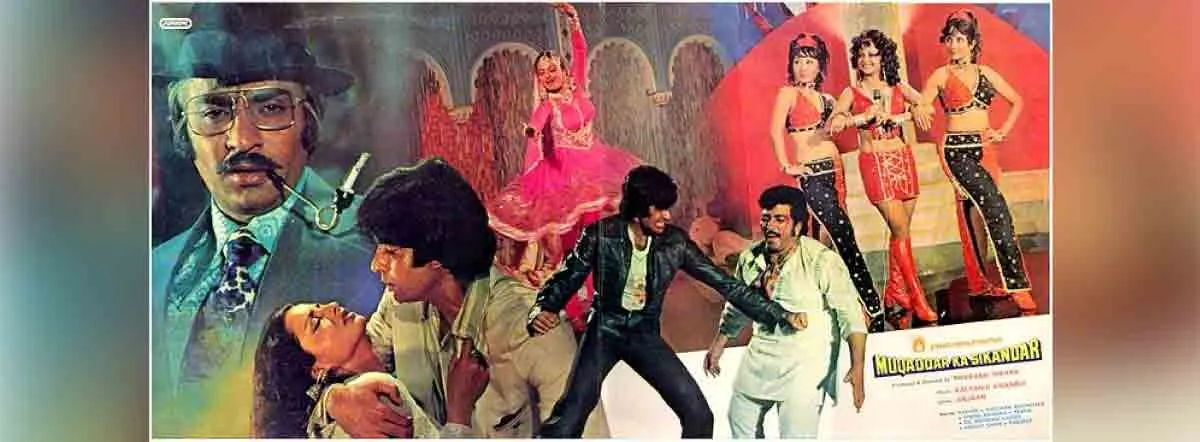
Cast Name and Characters
| Actor Name | Character Name |
|---|---|
| Amitabh Bachchan | Sikandar |
| Vinod Khanna | Vishal Anand |
| Raakhee | Kaamna |
| Rekha | Zohra Bai |
| Ranjeet | J.D. |
| Amjad Khan | Dilawar |
| Nirupa Roy | Fatima |
| Kader Khan | Darvesh Baba |
| Shreeram Lagoo | Ramnath |
| Goga Kapoor | Goga |
| Ram Sethi | Pyarelal |
| Manmohan Krishna | Piano Instructor |
| Paidi Jairaj | Dr. Kapoor |
| Yusuf Khan | Paul |
| Vikas Anand | Police Inspector |
| Sulochana Latkar | Vishal’s Mother |
| Sunder | Bus Conductor |
| Mayur Raj Verma | Young Sikandar |
Themes and Messages: Exploring the Depth of Muqaddar Ka Sikandar
Muqaddar Ka Sikandar is a timeless classic, rich in its exploration of deep and poignant themes that resonate with audiences even today. Here are the central themes of the movie:
- Fate versus Free Will
One of the most significant themes in Muqaddar Ka Sikandar is the battle between fate and free will. The characters, especially Sikandar (played by Amitabh Bachchan), grapple with circumstances that seem beyond their control. Sikandar’s journey from a poor, orphaned boy to a man of wealth is marked by a sense of destiny that both uplifts and burdens him. His love for Kaamna (played by Raakhee) and his rivalry with Vishal Anand (played by Vinod Khanna) illustrate how individuals make choices within the confines of their destinies. The movie asks the question—are our lives shaped by the decisions we make, or are we mere puppets of fate? - Unrequited Love
The theme of unrequited love is central to the emotional core of the film. Sikandar’s intense, yet unreturned love for Kaamna drives much of the narrative. His emotional turmoil and the suffering he endures because of his love are poignant and heartbreaking. This unrequited love symbolizes the pain of longing and yearning for something that may never be attained. The narrative also explores how unreciprocated love can influence one’s choices, behavior, and ultimately, one’s fate. Zohra Bai (played by Rekha) too, experiences unrequited love, but in a different context, adding another layer to this theme. - Societal Divides and Class Struggles
At its heart, Muqaddar Ka Sikandar is also a commentary on the societal divides of the time. The differences between the wealthy and the poor are illustrated through the characters of Sikandar and Vishal Anand. Sikandar, who starts life as a poor orphan, faces numerous challenges, including the prejudices of society. His struggle against class distinctions, while he tries to rise above his origins, highlights the harsh realities of the social divide. On the other hand, Vishal Anand, born into privilege, represents the other side of the coin, where money and status come with their own set of moral dilemmas and personal battles. This juxtaposition emphasizes how societal structures shape individual lives and destinies. - The Consequences of Power and Revenge
Another key theme in the movie is the destructive power of revenge. Dilawar (played by Amjad Khan) seeks revenge against Sikandar and Vishal, which ultimately leads to his downfall. The film examines how revenge, rooted in pain and injustice, consumes individuals, leading them down a path of destruction. It also poses the question of whether revenge ever truly satisfies the yearning for justice or simply perpetuates the cycle of pain. - The Complexity of Human Emotions
Muqaddar Ka Sikandar delves into the complex and often contradictory nature of human emotions. Characters like Sikandar, Kaamna, and Zohra Bai are all multifaceted, driven by love, anger, guilt, and a desire for redemption. Their inner conflicts and their attempts to navigate the emotional turmoil they face make them relatable to audiences. The film shows that human emotions are rarely simple; they are layered, sometimes conflicting, and often lead to unexpected outcomes.
Resonance with Audiences
These themes are universal, and that is why Muqaddar Ka Sikandar continues to resonate with audiences across generations. The tension between fate and free will, the agony of unrequited love, and the social and emotional struggles of the characters all touch on fundamental human experiences. The film’s portrayal of human vulnerability, coupled with its gripping drama and memorable performances, makes it a cinematic masterpiece that continues to evoke deep emotions and thought-provoking reflections on the nature of life and relationships.
Music and Soundtrack: Melodies That Still Tug at the Heartstrings
The music of Muqaddar Ka Sikandar, composed by the legendary duo Kalyanji-Anandji, is one of the most memorable aspects of the film. The soundtrack plays an integral role in amplifying the emotional depth of the movie, giving the audience a deeper connection to the characters’ feelings and struggles. The songs are a seamless blend of melody and lyricism, perfectly capturing the essence of love, pain, and longing.

Memorable Songs:
- “O Saathi Re” is perhaps the most iconic song from the film. Sung by Kishore Kumar, it beautifully portrays Sikandar’s (played by Amitabh Bachchan) emotional turmoil and unrequited love for Kaamna (played by Raakhee). The haunting lyrics by Gulshan Bawra capture the feeling of helplessness and longing in a way that still resonates with listeners today. The melody, combined with Amitabh Bachchan’s powerful performance, makes this song unforgettable.
- “Rakh Ke Rakh Le” is another beautiful track from the movie, which complements the tragic undertone of the story. Sung by Kishore Kumar, the song is about the complexities of love, featuring romantic and philosophical undertones that are characteristic of the film’s themes.
- The track “Meri Bhi Kismet”, also sung by Kishore Kumar, adds another layer of emotion to the film, reflecting the pain of characters who are faced with fate’s cruel hand.
The soundtrack overall becomes more than just background music; it serves as the emotional heartbeat of the film, elevating its narrative and making the audience feel the characters’ joys and sorrows.
Cultural Impact: Why Muqaddar Ka Sikandar Became a Timeless Hit
Muqaddar Ka Sikandar has left an indelible mark on Bollywood cinema, becoming a cultural touchstone for generations of viewers. Released in 1978, the film’s storytelling, star performances, and unforgettable music combined to create a movie that would influence future films.
The movie was groundbreaking in its portrayal of intense emotional drama and complex characters. It introduced audiences to a new kind of hero—Sikandar—who, despite his flaws, became a symbol of determination, love, and sacrifice. The movie’s success helped cement the stardom of Amitabh Bachchan and Vinod Khanna, both of whom went on to become superstars in the years that followed.
The themes of love, loss, and destiny also became a recurring motif in Bollywood films, inspiring many directors and writers in subsequent years. Muqaddar Ka Sikandar is still regarded as a classic that influenced the way Bollywood approached tragedy, romance, and character-driven storytelling.
Strengths and Weaknesses: What Worked and What Didn’t
Strengths:
- Storytelling: One of the film’s greatest strengths lies in its powerful narrative that combines love, loss, fate, and redemption. The film deftly explores the emotional lives of its characters, drawing viewers into their personal struggles and relationships.
- Performances: Amitabh Bachchan, Vinod Khanna, and Raakhee deliver stellar performances. Bachchan, in particular, shines as the conflicted hero Sikandar, portraying a character who is both vulnerable and determined. The chemistry between Sikandar and Kaamna is palpable, adding emotional weight to their tragic love story.
- Music: The music by Kalyanji-Anandji is unforgettable, with songs like “O Saathi Re” etching themselves into the hearts of the audience. The soundtrack elevates the movie’s emotional impact, making it timeless.
Weaknesses:
- Pacing: At times, the film’s pacing can feel slow, especially during certain melodramatic sequences. While these scenes are crucial to the emotional depth of the film, they can be a bit overwhelming for modern audiences who are used to faster-paced narratives.
- Predictability: Some parts of the plot, particularly the love triangle between Sikandar, Kaamna, and Vishal, may feel predictable, especially for viewers who are familiar with classic Bollywood tropes. However, the film’s focus on character development helps mitigate this.
Audience Reception: Then and Now – How Has It Aged?
When Muqaddar Ka Sikandar was released in 1978, it was a major hit, drawing in crowds with its emotional depth, star power, and memorable music. Audiences were deeply moved by the tragic story and connected with the characters’ struggles, making the film a commercial success and a cultural phenomenon. Over time, the film has earned a revered spot in Bollywood’s history as one of the finest examples of the classic era of cinema.
For modern audiences, the film might seem slow-paced, but its timeless themes of love, sacrifice, and fate still strike a chord. The performances, particularly those of Amitabh Bachchan and Raakhee, remain unforgettable. The music continues to be loved by music enthusiasts and is often considered one of the best soundtracks of that era.
While the film might not have the same impact on today’s fast-paced, modern Bollywood films, its emotional depth and classic narrative ensure that it remains a beloved classic that is still watched and appreciated.

Final Verdict: Is Muqaddar Ka Sikandar Worth Watching Today?
Yes, Muqaddar Ka Sikandar is absolutely worth watching today, especially for those who appreciate classic Bollywood cinema. The film is a rich blend of storytelling, drama, and unforgettable performances, making it a must-watch for fans of vintage Bollywood. While it may not have the same pacing as contemporary films, its emotional depth, music, and character arcs still make it relevant and enjoyable.
For new viewers, it offers a glimpse into the golden era of Bollywood, where storytelling was king and every scene carried emotional weight. It’s a film that demands patience and emotional investment, but for those who take the journey, it is a deeply rewarding experience.
Personal Opinions: My Take on Muqaddar Ka Sikandar
From a personal perspective, Muqaddar Ka Sikandar stands out as one of the most memorable films I’ve watched. The tragic love story of Sikandar and Kaamna has stayed with me long after the credits rolled, especially “O Saathi Re”, which is a masterpiece in its own right. Amitabh Bachchan’s portrayal of Sikandar as a man torn between love and destiny is one of his finest performances, capturing the very essence of vulnerability and strength. I found the emotional highs and lows of the film to be deeply affecting, and the music still gives me chills.
Conclusion: Wrapping Up the Muqaddar Ka Sikandar Movie Review
To conclude, Muqaddar Ka Sikandar is a cinematic masterpiece that continues to captivate audiences even decades after its release. Its themes of fate, love, and sacrifice, coupled with powerful performances and a memorable soundtrack, make it a movie that transcends time. Whether you are revisiting this classic or watching it for the first time, it’s a journey worth taking—one that will leave you reflecting on love, destiny, and the intricacies of life long after the movie ends.

